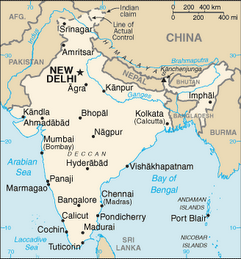 Today I spent meandering the campus streets of Jawaharlal Nehru University (JNU) in South Delhi with a Bihari friend studying in a Ph.D Linguistics program. Founded in 1967, JNU is one of a few Delhi academic institutions including the more urban Delhi University, and the famous Indian Institute of Technology (IIT). It is a school named after a man with one of the strongest Indian political legacies. Nehru, India's first Prime Minister, and longest serving, held the first post-colonial post from 1947 until his death in 1964. The school that bears his name is, as was explained to me, fairly liberal in its academic flexibility, but hasn't yet moved as far in the direction of development as its eponymous namesake could have hoped. Whereas campuses in Hyderabad host wireless internet, the classrooms and library at JNU are, while palatable, not modern.
Today I spent meandering the campus streets of Jawaharlal Nehru University (JNU) in South Delhi with a Bihari friend studying in a Ph.D Linguistics program. Founded in 1967, JNU is one of a few Delhi academic institutions including the more urban Delhi University, and the famous Indian Institute of Technology (IIT). It is a school named after a man with one of the strongest Indian political legacies. Nehru, India's first Prime Minister, and longest serving, held the first post-colonial post from 1947 until his death in 1964. The school that bears his name is, as was explained to me, fairly liberal in its academic flexibility, but hasn't yet moved as far in the direction of development as its eponymous namesake could have hoped. Whereas campuses in Hyderabad host wireless internet, the classrooms and library at JNU are, while palatable, not modern.  Over a dhaba lunch, and a five rupee coffee, I realized that despite different appearances India is home to a surprisingly strong cafe culture. Similar to a weekend afternoon in Europe, scores of students sat around makeshift chairs, crumbled concrete cubes atop a dusty hillside, nursing small chai and coffees over long conversations. It's Indian dhaba culture, and I've noticed it across UP, Punjab, and Haryana.
Over a dhaba lunch, and a five rupee coffee, I realized that despite different appearances India is home to a surprisingly strong cafe culture. Similar to a weekend afternoon in Europe, scores of students sat around makeshift chairs, crumbled concrete cubes atop a dusty hillside, nursing small chai and coffees over long conversations. It's Indian dhaba culture, and I've noticed it across UP, Punjab, and Haryana. Despite the tranquility of our sunny afternoon, my friend explained to me issues that cause academic concerns. In the past five years government scholarships have grown to address Scheduled Castes (SC) and Scheduled Tribes (ST) in funding, in addition to need-based funding for families who earn under 1 lakh rupees ($2500 per year). Preferential treatments, however, are controversial. Members of ST, and students who speak one of 24 specified languages, can take their pre-college exams in their mother tongue. Though locations change, some fundamental inequalities are issues that transgress international boundaries.



No comments:
Post a Comment